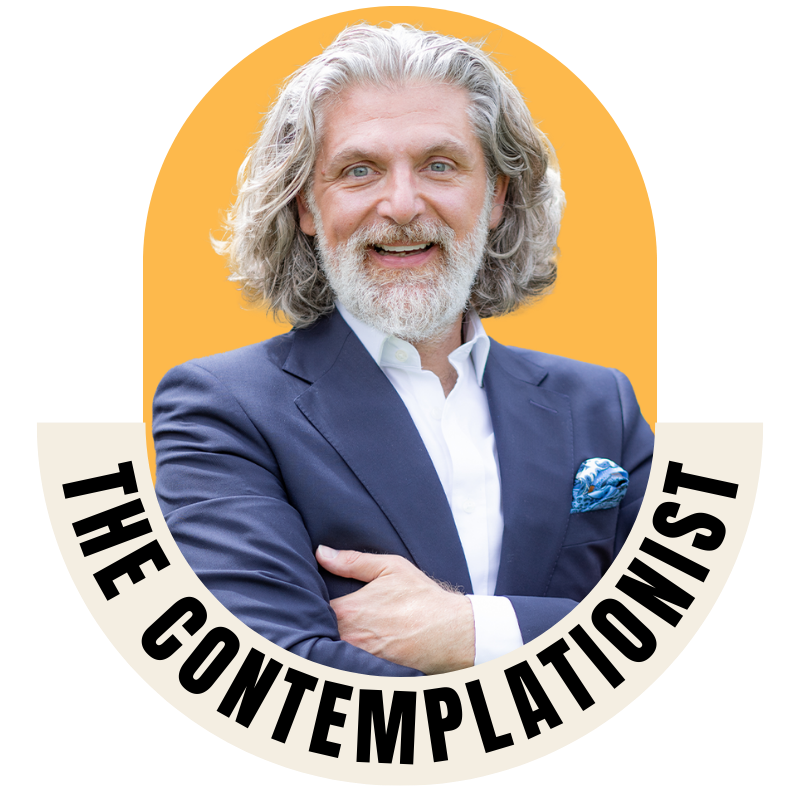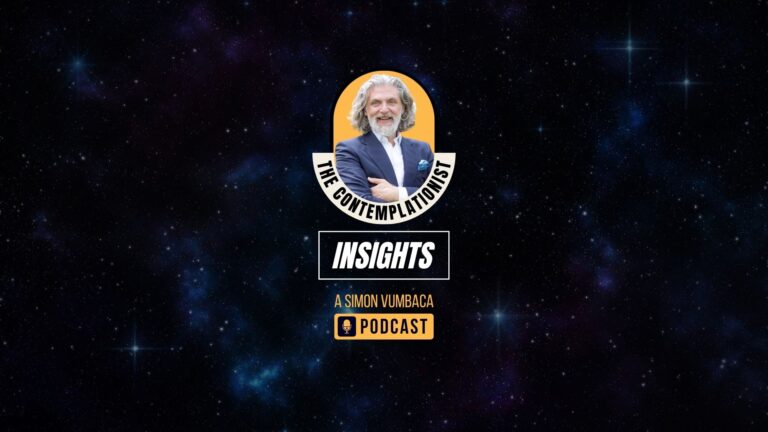On 8th November 2024, I took the (virtual) stage at the Digital Security Festival, an event known for exploring the boldest questions about technology, innovation, and the future of business. This year’s focus was on the transformative impact of cyber-presence in business, and I couldn’t resist tackling a powerful reality: the shift from information-driven to data-centric societies—and what that means for businesses, leadership, and even our sense of self. In my keynote, I explored how companies like Amazon, Apple, and Spotify have thrived by leveraging data-driven models, automating decisions, and shaping entire industries. But success powered by data isn’t without its challenges—especially for leaders, decision-makers, and even individual identity. The very tools that offer efficiency can also create dependency, burnout, and even identity crises, leaving us wondering: “When the sky has no limit, how far should we go?”
As AI automation, and quantum computing advance, we face a critical question: Are we leading technology—or is it leading us? With constant innovation comes pressure: to be the first, to stay relevant, keep learning, and adapt faster than ever. This endless cycle can create a dangerous sense of data-driven dependency, impacting mental health, decision-making, and even how we define our worth. But the answer isn’t as complicated as it seems. In fact, it’s surprisingly simple—yet often overlooked:
“Stop. Think. Lead on Purpose.” By taking a step back, redefining how we approach technology, and realigning our actions with purpose, values, and intention, we can harness tech without being consumed by it. In a world driven by constant notifications, instant communication, and limitless tech potential, leading with clarity and purpose becomes the most valuable skill of all. The Future Belongs to Leaders Who Lead on Purpose—Not by Algorithm.
Are we leading technology—or is it leading us?
The 8th November 2024 I stepped onto the (virtual) stage at the Digital Security Festival to deliver my virtual keynote. The Digital Security Festival is a dynamic event that tackles the boldest questions about technology and the future, normally held in some great Italian location. Now in its sixth edition, this year’s focus was on the transformative impact of cyber-presence in business.
As keynote speaker surrounded by technology minded individuals, I could not resist the opportunity to explore a powerful fact: how the growing cyber-reality reflects a broader shift from information driven to data-centric societies and its impact on valuable business models.
In this keynote, I unpacked the profound implications of this shift, challenging the audience to think beyond numbers and algorithms to the human and philosophical shifts shaping the future of business, leadership and interactions.
The expansion of cyber presence in businesses is a fascinating phenomenon, especially when we consider how we, as individuals, relate to it.
Let me explain.
Everything in business aims to competitiveness and profit generation. The growth of cyber presence is undoubtedly the land of opportunities. We constantly seek an edge, an advantage. We focus on “improving results”, “better services” and alike.
Businesses, particularly highly successful ones such as Apple, Amazon, Spotify etc, are structured around reliable repeatable models. These to be systematic, need to be mainly process driven. These models are built on processes that accentuate predictability and repeatability.
Information is King: is that still so?
Historically, this translated in the say that “information is king”.
Initially, generic industry or product-use specific information was enough to gain advantage; then it wasn’t. All had access to it. So, information had to be more and more detailed, on time and specific. In some instances, behaviours and interactions started to be added in the information mix, making it a maze of interesting concepts. I recall when screens started gathering the eye movement to see where users’ attention focused and, in turn, deploying personalised screens that, together with personalised colours.
Over the past two decades, however, we’ve seen a significant shift: from being information-centric to being data-driven. Companies such as Oracle and Salesforce.com managed to harvest the reward of this trend. The data compiled was represented back to the users via cleverly thought landing reports that could pretty much tell anything about anything that was asked of them. Yet, we still had to define what to ask. It was, to a point, down to a board or management to define a direction.
The era of King Data and its unexpected consequences
Now the focus is more on data than context. It’s a profound change, as a data-driven approach transforms how companies operate. For example, a data-driven company might use tools such as CRM systems to predict outcomes based on historical data. This approach isn’t merely about gathering information; it’s about using data to confirm what actions are most likely to achieve success. Projections and forecasting is normally based on old data that is put to the stress test of algorithms.
This may seem a subtle change in perception, it is, in fact, a fundamental one. Add the complexity of quantum computing into the equation, and the significance increases exponentially.
With the expansion of AI, and its penetrations to seemingly all things, the transition from information-centric to data-driven models becomes even more forceful. This shift profoundly affects us as individuals, in our daily lives and not just businesses. How we relate and manage our personal interaction with data is impactful on our daily lives, jobs and even perceived worthiness!
Quantum computing models, the next level of computing being implemented, can process even more variables simultaneously, formulating entirely new business models. These models will be – we are told – far more powerful and predictive, providing near-guaranteed outcomes in certain scenarios. This may seem great for business. And will impact humans alike. Great right? More opportunities I hear you thinking. It would be so, except we must keep a clear view of the aim.
When the sky has no limit, how far should we go?
It stands reason that with the re-writing of the rules book on business, things change. Certainly, the hacktivist collectives are trying to dominate this new space and redefine the rules. How we dedicate our time and our role will shift. Automation means less human interference. Does it mean more available time to do something else?
Instead of being decision-makers, data-centric decisions will require tools for implementing decisions, rather than to define data-driven predictions.
Now, this raises a broader societal issue: how far shall we go?
Technology progresses rapidly, which we often embrace. Makes early adopters feel empowered by being at the forefront of innovation. This fast-paced adoption has also unintended consequences, particularly for mental health. The constant relentless evolution of technology, one of its initial appeals, can lead to feelings of obsolescence. If someone becomes an expert in a technology, that someone gains importance in the structures he operates in. That “empowerment” creates a form of success. However, when that same technology becomes outdated – in shorter than ever timelapses -, they may feel their skills—and by extension, themselves are obsolete.
This can contribute to phenomena such as burnout, a growing concern over the past decade. Burnout today has become deeply ingrained, affecting not just our work but our fundamental interaction with what we do.
Another emerging issue is imposter syndrome. Many leaders and high achievers, particularly if success was gained via deployment of technological tools, find themselves doubting their actual abilities and the appropriateness level of the reward they are receiving as a result.
The reach does not stop there – the concept of “data slavery” is also evolving. This term refers to how individuals become increasingly defined and constrained by the data they produce and interact with. Young people, for example, grow up in digital ecosystems that dictate the rules of engagement, not based on universal truths but on the commercial interests of private companies.
These disparities and even “digital discrimination” where participation in specific platforms influences how individuals are perceived and treated. Take the shift that Twitter experienced becoming X as an example. Over time, these shapes perceived identities, interactions, and even self-worth.
In turn, this raises concerns about a form of multiple personalities and the rise of mental health unbalanced that seem to have expanded. Particularly amongst leaders. People may create multiple personas—one for social media, one for work, one for personal life. This fragmentation can lead to confusion and a lack of coherence in one’s perceived sense of self.
The answer was always within reach—we just thought it couldn’t be that easy.
Ultimately, as practical philosopher, with acute interest in all thing’s leadership, this is where I believe we have been dismissive of the obvious resolve.
Stop. Think. Lead on Purpose
Redefining the concept of time, regaining a form of understanding and ideally control over it, helps massively. So does aligning actions with purpose on all a leader does.
Small changes have lasting effect. Take emails as example. We used to treat emails as correspondence and letters. Then, progressively, their immediacy and access to computers meant that we were expected to deal with emails during working hours, on our working computers. Then again, with the advent of portable devices, Blackberry and iPhone included, we are expected to immediately address emails as we received them. Even out of hours. That changed the way we treated pocket tech and cemented the shift with personal time away, in a sense. Priorities have become varied. Now emails are the “slow” communication form. We communicate even faster via direct messaging. Don’t you worry if your phone is not nearby, your smartwatch will make sure you will not miss anything…and so the wheel spin goes…
All of the above makes our attention and time allocation even more important. Coupled with the time needed to adapt and learn the new technologies, not to be left behind or treated like a last century resource, we invest more and more of our own time, often subconsciously, in learning how to stay relevant. We do so via webinars and automated videos platforms, dissociated from specific technologies, but linked to many data centric algorithms.
I don’t know you, but my days have 24 hours. I like to spend at least half of them awake. By awake, I mean alert and aware. I like the practicality of access that some technology brings.
In life, though, there are no absolutes; Just a series of compromises, as they say in sailing. So how can we compose with it all?
I believe in alignment. Alignment of what we do with why we do it and how. All my observation of successful persons and leadership models proves it. The challenge lies in aligning our actions, purpose, vision and values within our own universal truth influenced by this evolving digital landscape. If these elements are misaligned, we risk perpetuating inner conflicts and societal polarisation. The same goes for adopting a Data centric society and leading primarily via data based decisions. We all (mid term) end up doing the same and killing the uniqueness that differentiate the brilliance of each one of us and us as leaders.
With that in mind, I invite you to pause, reflect, and realign actions with a greater sense of purpose and universal truth. I invite you to think carefully if all the new technologies surrounding you are really worth their deployment mid to long term or if they are just a short-term fad. Who knows, maybe watching apples fall will make of us Newtons!






